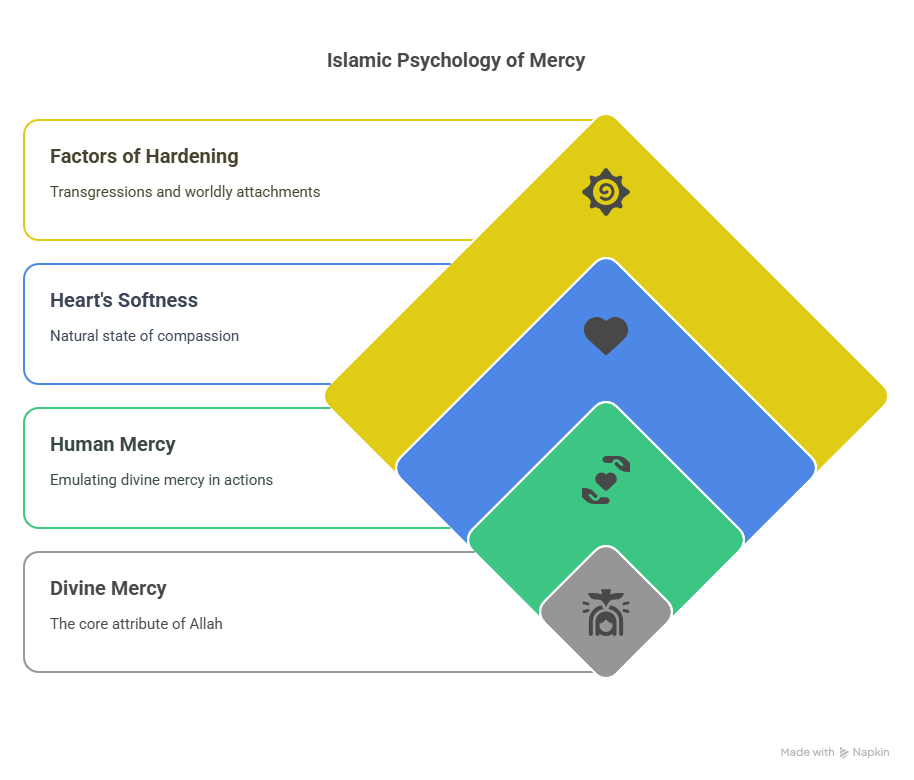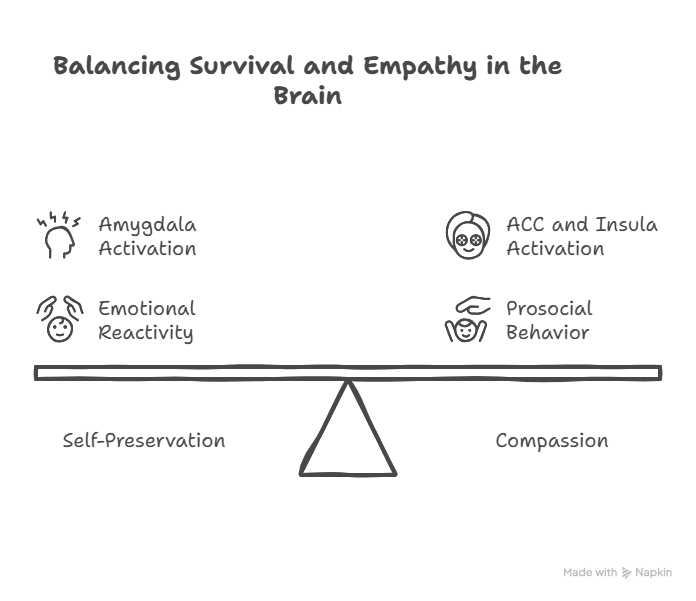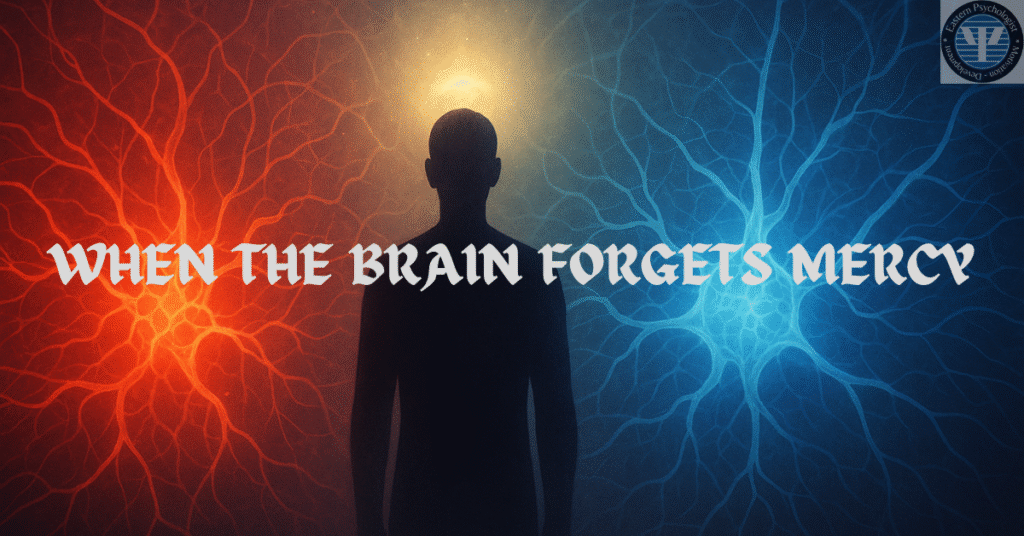Written by Raheela Shahid & Taaha Ahmad
Table of Contents
Sarah looked out from her perch as manager of the ritzy coffee shop at the homeless man huddled in cold outside. Three months ago she would have quietly pushed warm cup and sandwich his way. But something had shifted.
Corporate pressure, rants of the disgruntled customer, increasing bills at home, all stress factors had eaten something away inside her. Where he was now huddling in the teeth of the winter wind she now felt nothing. She was irritated, worse, than nothing. She hissed to her barista, “Some one call security.”
What happened to Sarah’s capacity for compassion? How does a heart that once overflowed with mercy become seemingly frozen? The answer lies not in moral failure, but in the intricate workings of our brain, a remarkable organ that can both create and destroy our ability to connect with others’ suffering.
Compassion fatigue: What it is and what it is not
New brain experiments show that empathy and compassion are not boundless things. Dr. The experiments of Tania Singer at Max Planck Institute prove that this experience with repeated exposure to others distress rewires our brain circuitry. When overwhelmed by chronic stress or habituated with suffering, the anterior insula and anterior cingulate cortex, responsible parts of the emotional pain processing regions, start experiencing less activation.
It is like a muscle and it is overworked and tired. When we are always exposed to pain, trauma or injustice without sufficient time to recover, then our neural pathways will defend ourselves by becoming emotionally numb. It is not something bad to be weak, it is something of survival. When the resources are exhausted, the brain will resort to self preservation which overrides the aspect of compassion.
According to the study by Dr. Adam Grant on the topic of compassion collapse, the neurological change may affect not only healthcare professionals and social workers but also parents. In brain imaging research, chronic stress increases the levels of cortisol that directly damages the prefrontal cortex in our brain which is our command center to make moral choices and even our ability to control our emotions.
Our brain, the alarm system, called the amygdala, is overactive and in the case of a long-term stressful situation, it causes the fight-or-flight responses to rule over our intended loving nature. In the meantime, our vagus nerve which causes the rest and digest response because of which we are capable of compassion, becomes repressed. It creates an ideal environment that allows callous acts.

The Developmental Roots of Callousness
To appreciate why some people apparently are more callous in nature, we have to look at early development of brains. In childhood, a neural pathway of empathy is built up during the course of secure attachment relationships and builduppositive social offers. These important circuits can be severely disrupted when children are neglected, mistreated or live most of their lives in a constantly unstable environment.
Findings of a study conducted on callous-unemotional traits conducted by Dr. James Blair establish that there exist certain genetic variants that when coupled up with unfavorable childhood events can result in the lack of development of empathetic centers. Moral reasoning takes place in the orbitofrontal cortex, and the volume of gray matter there can be depleted in the severe cases of empathy deficit.
But there is a hope with neuroplasticity. The minds of even adults also can learn to form new connections in the brain by practicing compassion, mindfulness, and connection deliberately. Coldness may not be permanent since the brain has an amazing ability of rewiring itself.
An Islamic Perspective on the Heart’s Condition
The Islamic psychology places special emphasis on the idea of mercy (rahma). Quran refers to Allah as the Most Gracious, the Most Merciful (Ar-Rahman Ar-Raheem) and elevates mercy as a principle distinguishing feature of the Divine spirit out of which human beings are expected to behave.
The Prophet (peace be upon him) stated, the merciful people will be treated mercifully by the Merciful. Show mercy to others and get mercy. Pity them that are figuring in the world, and thou in the heaven will pity thee. According to this teaching, mercy is not only a moral decision but also spiritual practice that helps us associate with the higher side of our personality.
The scholars of Islam have known that the heart (qalb) may get hardened due to many spiritual and psychological reasons. That is because those who do not follow the guidance in the Quran will have their hearts hardened as stones by committing frequent errors, renouncing spiritual practices, or being too occupied with worldly things.
In such a way, hard-heated actions are not only a neurological but also a spiritual crisis. The inclination of the heart is to mercy and the closeness to the Divine though; these two things can be blocked by certain variables.

Psychology of Moral disengagement
The theory of moral disengagement by a psychologist called Albert Bandura elucidates how an average person can commit an evil act without being overcome by guilt and remorse. The process entails a number of psychological mechanisms, which enable persons to take a detachment regarding their moral standards.
The effect of euphemistic labeling is to make certain harmful behavior acceptable by the use of words. The victims are less-than-human after the process of dehumanization, and their mistreatment is more acceptable. Shifting of blames displaces the blame to authority or things beyond one control.
Such mechanisms may be triggered when there is a severe stress, trauma or social pressure. Moral disengagement can be caused by the same neural circuits that are used to defend us by numbing emotional responses, so the combination is lethal, since it allows cold-blooded behaviour.
These psychological procedures allow defining why even such a sensitive person as Sarah may gradually lose her sense of empathy. It is not an instant change but a long-term gradual loss of moral sensitivity due to constant exposure to stressful circumstances that cannot be properly supported and followed by relaxing.
The Internal War Between Compassion and Self-Preservation
All humanity lives with a constant conflict between the desire to save their lives and concern with other people. This civil war is enacted in some of our brain parts that fight to have control of our actions.
The limbic system mainly comprising of the amygdala and the hippocampus is survival oriented and self-interest. These brain alert systems can countercharge the prefrontal cortex with its ability to reason and be compassionate when stimulated by stress or fear. This forms what neuroscientists term as amygdala hijack, in which emotional reactivity gets to take over our reasonable judgment.
At the same time, both anterior cingulate cortex and insular cortex are balancing our association to what others are going through. When observing distress, they are the parts that are stimulated and they encourage altruism. The power of such competing groups of neural networks is what makes us act either with compassion or callousness at any given moment in time.
In contemporary societies, this balance is usually skewed to self-preservation. The stimulation, economic strain, social media inadequacy, and media overload lead to chronic stress that stimulates the amygdala and inhibits empathetic centers. This discovery about how our brain functions allows us to go about cold-hearted behavior in the most accountable yet compassionate manner.

Prophetic Teachings toward Redemptive framework
The teaching of the Prophet Muhammad provides some deep thought as to how we should preserve mercy even in challenging situations. His example proves that compassion is not one of the weaknesses but spiritual strength that must be developed and guarded.
There is one very pithy hadith, which says: the believer neither eats until he is satisfied, when his neighbor is hungry. This teaching confronts us in order to be conscious of the needs of other people at a time when we are facing our challenges. It tells us that getting stronger actually means placing a wider range of concern and not less.
Self-care was another key that was pointed out by the Prophet to find a base or foundation of serving others. He told me, Your body is entitled to rights over yourself, your soul is entitled to rights over yourself and your family is entitled to rights over yourself, so give each one its rights. This middle ground approach acknowledges that we cannot afford to be insensitively compassionate since we need to take care of ourselves.
Moreover, all people according to the Islamic teachings have a dignity (karama) that they have despite their situations. This point of view offers a religious remedy to human-dehumanizing which many times comes prior to unsympathetic conduct.
The Restoration Scientific and Spiritual Strategies
The new science of contemplative neuropsychology indicates that particular practices have the ability to heal and develop our compassion capabilities. After only seven weeks of meditation focused on loving-kindness, based on Buddhist, but reconcilable with Islamic dhikr traditions, brain areas involved in empathy become more active.
Mindfulness meditation is useful in controlling stress response of the amygdala as well as enhancing the functioning of prefrontal cortex. Dr. The study conducted by Sara Lazar at the Harvard medical school proves that daily mediation leads to the thickening of the parts of the brain linked to control of emotion and empathy.
According to the Islamic principle, frequent prayer (salah), recollection of Allah (dhikr), and meditation on Quranic verses of mercy have the neuroplastic similar functions. Such activities develop neural networks which enable positive responding in a stressful situation.
The second tool to maintain empathy is to establish a social relationship.In the contemporary studies, it was fixed that the application of the parasympathetic system is the fact in the case of close social contact of the person and they are established to have the opportunity to allow the possibility of ability to empathize with people.
The way out of the Cycle of Callousness
This salvation is about neurological healing and spiritual healing of the cold-heartedness. Just like in the case of physical therapy, it restores disrupted muscle tissue, compassion-focused practices have the potential to restore empathic circuits in the brain.
The first one is to identify the symptoms of the compassion fatigue when they are still manageable. This may come in form of enhanced irritability, emotional indifferentness, cynicism of suffering of other people or seeking reasons not to assist other people.
An example is the research of self-compassion conducted by Dr. Kristin Neff that demonstrates that when we are kind to ourselves, we develop the emotional capacity to be kind to others. These findings are close in a relationship with Islamic notions of tawbah (repentance) and rahmah (self-mercy).
Constant exposure to tiny traces of human sufferings of others with enough recovery time and support systems can restore our sensitivity towards suffering without bombarding our neuronal systems. It could be as simple as spending a few hours volunteering, trying to do some small favours, or just listening to other people and their stories in an interested but non-judgmental way.
The Way Ahead: Alternatives between Science and Spirituality
The knowledge of the neuroscience of cold-hearted behavior is not an excuse, but it is a milestone on the path of recovery. Through the understanding of the biology and psychology of cause of callousness, we are better placed to develop better practices of preventing and treating callousness.
Such integration of scientific study and Islamic wisdom is especially a powerful idea. Although neuroscience has demonstrated how the process of compassion fatigue takes place, Islamic doctrines offer the ethical guidelines and spiritual acts to maintain the essence of mercy.
Coldness does not have to be the end of the story of Sarah. By getting to grips with her brain protection mode, by exercising compassion toward herself, reviving her spiritual values, and slowly restoring her power to empathise, she will find its way to grow her inherent instinct to show mercy.
The memory can forget the mercy, but it can only remember mercy through the deliberate endeavor and collective efforts as well as acknowledging that mercy is a spiritual process and neurological ability that needs to be cultivated.

Reflection
When you assess your mercy capacity, observe what stress or overwhelm could be getting the way of compassion in your life. What would you do to be the empathetic person that you are within the safe boundaries of your emotional well-being?
It is advisable to note mercy starts with us. The three main aspects of scientific, spiritual, and the truth of compassion enable us to either our pain or other people being cold-blooded with a wiser attitude and a belief in disintegration.
Call to Action: In the event that you have found this article useful, please share it with someone that would be able to use the knowledge on the neuroscience of empathy. To get more information on the irreducible overlap of psychology, neuroscience and spirituality, consider joining our newsletter at easternpsychologist.com. How are you going to be compassionate on your life and among people today?


Pingback: 6. Hidden Sociopaths are not soulless? Islamic Ethics vs. Neurological Determinism - Eastern Psychologist